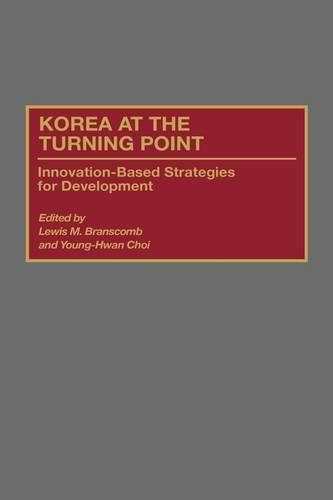
Korea at the Turning Point: Innovation-Based Strategies for Development
(Hardback)
Publishing Details
Korea at the Turning Point: Innovation-Based Strategies for Development
By (Author) Lewis M. Branscomb
By (author) Young H. Choi
By (author) Christopher L. Edwards
Bloomsbury Publishing PLC
Praeger Publishers Inc
25th November 1996
United States
Classifications
Tertiary Education
Non Fiction
Political economy
Macroeconomics
338.9519
Physical Properties
Hardback
304
Description
Can Korea realize its dream of matching the economic performance of the G-7 nations in the next 15 years The marshalling of capital, and dedicated, low-cost labor by authoritarian governments in the past created double-digit economic growth based on imported technology. How can Korea's young democracy, fledgling science, and liberalizing policies compete against a new level of global competition Korea must build its research capability, accelerate the development of smaller, high-tech firms, and reduce bureaucratic conflict in support of an innovation-based strategy. This book puts Korea's technological challenge in its historical context, documents the reasons past strategies are no longer viable, and presents a blueprint for the next stage in Korean development. Korean economy is one of the most exciting and dynamic ones in the world. Korea finds itself in the position of being regarded as respected competition by nations and firms which earlier regarded it only as a source of low-cost, high-quality production. As the economy has slowed, the Korean government and private sector have faced the challenge of making a change in strategy in regard to its approach to technology, and how the economy is to be managed. This analysis of where Korea has been and how it will deal with technology and economic management is conducted by prominent Korean and American scholars.
Reviews
"A superb collection of history and fact concerning the phenomenal growth of the Korean economy since 1962...It will remain for a long time as the standard work in the field."-Dr. J. Thomas Ratchford Director, Center for Science Trade and Technology Policy George Mason University
"Informative, comprehensive, perceptive: a key contribution to understanding the basis of Korea's economic development."-Jean Eric Aubert Senior Staff Member Directorate for Science, Technology, and Industry in the OECD
"This is a cogent analysis of the remarkable progress Korea has made since 1965 and the difficult decisions it faces now."-Dr. Donald F. Hornig Professor of Chemistry in Public Health, Emeritus Harvard University
Korea at the Turning Point provides some useful and interesting insights into Korean economic life right before the economic downturn hit South Korea.-Journal od Third World Studies
This book puts Korea's technological challenge in its historical context, documents the reasons past strategies are no longer viable, and presents a blueprint for the next stage in Korean development.-the Asian Reporter
"Korea at the Turning Point provides some useful and interesting insights into Korean economic life right before the economic downturn hit South Korea."-Journal od Third World Studies
"This book puts Korea's technological challenge in its historical context, documents the reasons past strategies are no longer viable, and presents a blueprint for the next stage in Korean development."-the Asian Reporter
Author Bio
LEWIS M. BRANSCOMB is Aetna Professor of Public Policy and Corporate Management, emeritus, and directed the Science, Technology, and Public Policy program at Harvard University. A former Vice-President and Chief Scientist of the IBM Corporation and expert examiner on science and technology policy in Mexico and Korea for the OECD, Branscomb is a prolific author on technology policy. YOUNG-HWAN CHOI is a former President of STEPI and previously served as Vice Minister for Science and Technology in the Republic of Korea. He was visiting Fellow in the Center for Science and International Affairs at Harvard University from 1993 to 1995, and is now President of the National Railroad College in Korea.
